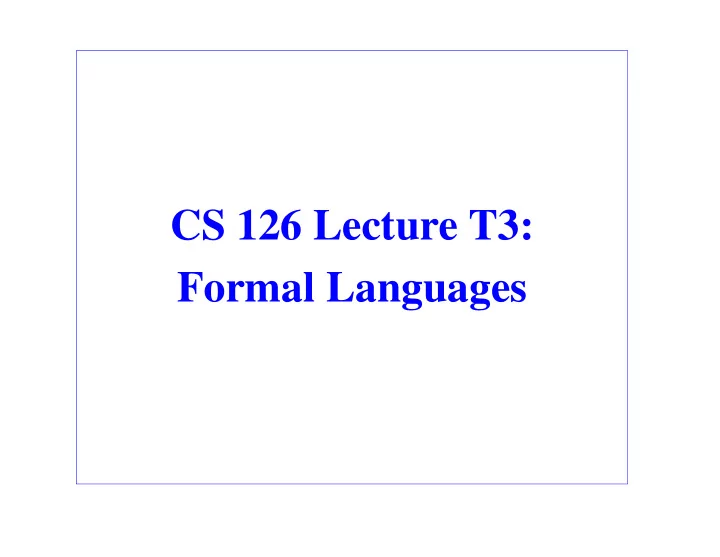

CS 126 Lecture T3: Formal Languages
Outline • Introduction • Defining grammar • Type 3 grammars • Type 2 grammars • Chomsky hierarchy • Conclusions CS126 16-1 Randy Wang
Where We Are • T1 - Simplest language generators: regular expressions - Simplest language recognizer: FSAs • T2: more powerful machines - FSA, NFSA - PDA, NPDA - TM • T3: more powerful languages associated with the more powerful machines • T4: - Nature of most powerful machines - Languages that no machine can ever deal with CS126 16-2 Randy Wang
Review: Formal Languages • Formal definitions - An alphabet : a finite set of symbols - A string : a finite sequence of symbols from the alphabet - A language : a (potentially infinite) set of strings over an alphabet • Intriguing topic: finite representation of a language - How? + language generators (a set of rules for producing strings) + language recognizers CS126 16-3 Randy Wang
Languages and Automata CS126 16-4 Randy Wang
Why Learn Languages? CS126 16-5 Randy Wang
Outline • Introduction • Defining grammar • Type 3 grammars • Type 2 grammars • Chomsky hierarchy • Conclusions CS126 16-6 Randy Wang
Example 1 CS126 16-8 Randy Wang
Example 1 (cont.) CS126 16-9 Randy Wang
Example 2 CS126 16-10 Randy Wang
Example 2 (cont.) | <iteration-stmt> | ... if (x == 0) { while (y == 1) { if (z > 0) { Each box is one production. s = z * 2; } } } CS126 16-11 Randy Wang
Example 3 CS126 16-12 Randy Wang
Example 3 (cont.) CS126 16-13 Randy Wang
Outline • Introduction • Defining grammar • Type 3 grammars • Type 2 grammars • Chomsky hierarchy • Conclusions CS126 16-14 Randy Wang
Type 3 Grammars CS126 16-15 Randy Wang
Type 3 Grammars and Regular Expressions CS126 16-16 Randy Wang
Example <A> -> <z>0 <z> -> <A>1 <z> -> ε 0 ε ε S z A F 1 CS126 16-17 Randy Wang
Demo: Construction of Equivalent FSA CS126 16-18 Randy Wang
Outline • Introduction • Defining grammar • Type 3 grammars • Type 2 grammars • Chomsky hierarchy • Conclusions CS126 16-19 Randy Wang
Context-Free Grammars CS126 16-20 Randy Wang
Example Context-Free Grammar | <iteration-stmt> | ... if (x == 0) { while (y == 1) { if (z > 0) { Each box is one production. s = z * 2; } } } CS126 16-21 Randy Wang
How to Recognize Context-Free Grammars CS126 16-22 Randy Wang
Outline • Introduction • Defining grammar • Type 3 grammars • Type 2 grammars • Chomsky hierarchy • Conclusions CS126 16-23 Randy Wang
Type 1 Grammars (Context-Sensitive) and Type 0 Grammars CS126 16-24 Randy Wang
Chomsky Hierarchy, Languages and Automata CS126 16-25 Randy Wang
Language Expressiveness and Machine Power CS126 16-26 Randy Wang
Example Language Outside Chomsky Hierarchy: Lindenmayer Systems Reproduction Growth CS126 16-27 Randy Wang
Graftal Plants: Lindenmayer in 2D “Production” rules: add one to each segment of my trunk; replace each branch with myself of prev generation CS126 16-28 Randy Wang
Outline • Introduction • Defining grammar • Type 3 grammars • Type 2 grammars • Chomsky hierarchy • Conclusions CS126 16-29 Randy Wang
More on Languages, Machines, and Life • The fine art of describing infinite beauty and variety with finite representation - Shakespearean sonnets and machines that can identify authorship? (Is intelligence/art nothing but a set of rules, with some non- determinism thrown in?) - DNA: the language of life (Is life nothing but a set of rules, with some non-determinism thrown in?) - ...... CS126 16-30 Randy Wang
What We Have Learned Today • What is a grammar? • What is a type 3 grammar? type 2? type 1? type 0? • How to construct an FSA from a type 3 grammar? • What is the Chomsky Hierarchy? • What type of automata recognize which grammars? CS126 16-31 Randy Wang
Recommend
More recommend